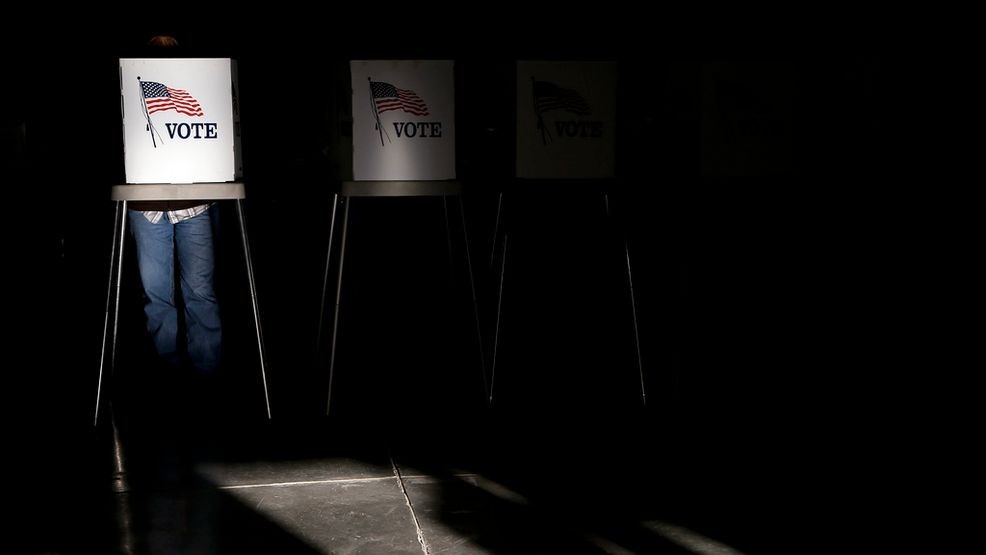What if every state voted like Nebraska?
HUNT VALLEY, Md. (TND) — Nebraska is telling Donald Trump it wants to keep its election law as is.
“Nebraska voters, not politicians of either party, should have the final say on how we pick a president," Nebraska state Sen. Mike McDonnell, a former Democrat who just joined the GOP this year, said in an announcement this week.
He could have been the former president’s saving grace, and agree to change an election law that’s been in place for three decades, essentially ensuring the state’s full slate of electoral votes go to Trump. Under the current and enduring rules, Nebraska's three electoral votes are awarded based on how each of the state's three congressional districts votes. While Nebraska has voted solidly Republican in presidential elections for decades -- the last time it fully went blue was 1964 -- but occasionally the district centered around the population center of Omaha votes blue.
McDonnell says just 43 days before Election Day is not the time to change how the election works in the Cornhusker State.
“To compare it to a football game, it's like there's two minutes left, you call time out, you say 'I know the value of a field goal is three points; we want to change it to four because that's how we want to win the game.’ It's just not right. It's just not fair,” he explained.
The state’s GOP Gov. Jim Pillen, however, sees this differently, but begrudgingly announced he will not call for a special legislative session, as Republican do not have the 33 votes necessary to make the change.
“That is so profoundly disappointing to me and the many others who have worked so earnestly to ensure all Nebraskans’ votes are sought after equally this election,” he said.
But how did Nebraska gain this weird election law, and why did Trump try to change it?
In all but two states, Nebraska and Maine, electoral votes are winner-take-all. This means, in every other state, the candidate who wins the popular vote gets all the state’s electoral votes.
But, in 1969, Maine decided to take a different approach and use what’s called the “congressional district method,” which allowed the Pine Tree State to allocate two electoral votes to the state popular vote winner, and one electoral vote to the popular vote winner in each congressional district. In Maine’s case, two.
Nebraska enacted the same rule in 1992, awarding three electoral votes to each of the three districts.
The rule changes didn’t make much of a difference right away; the statewide winners swept all the state’s districts anyway.
However, that changed in 2008, when Nebraska gave four of its electoral votes to John McCain, and one to Barack Obama. The former president’s single vote came from Nebraska’s second congressional district, which encompasses the core of Omaha, a city analysts are now calling the crucial “blue dot” in the 2024 election.
In 2016, Hillary Clinton won three electoral votes from Maine, but Trump won one electoral vote in Maine’s second congressional district, which covers most of the state’s rural and suburban areas.
For Nebraska in 2008, it was the first time a Democrat won a vote in the state since 1964. For Maine, it was the first time a Republican won a vote in the state since 1988.
In 2020, those same districts each gave electoral votes to the statewide popular vote loser, though they effectively canceled each other out.
Yet, these two districts prove that the popular vote winner is not always the one supported by the entire state. It also shows why Trump pushed for the winner-take-all method in Nebraska, but not in Maine.
He bemoaned Nebraska’s decision to stay the course on his Truth Social platform:
“It would have been better, and far less expensive, for everyone!” he wrote of the winner-take-all method, adding that McDonnell is “just another grandstander.” “I LOVE OMAHA, and won it in 2016. Looks like I’ll have to do it again!!!”
The debate raises the question: what if every state did it like Nebraska and Maine?
Looking backwards, in three of the six presidential elections between 2000 and 2016 (2000, 2012 and 2016), the winner of the most votes nationwide would not have won the presidency.
Some people believe the congressional district method truly reflects the will of the people. Others do not, and many argue the nation would have the same problems it has today with the winner-take-all system – just on a local level versus a state level.
Proponents of the winner-take-all method argue the district method would actually make the presidential electionless competitive. A 2015 report from FairVote.org suggests fewer people live in current swing congressional districts than in current swing states.
Those critics also argue this method would make it more likely for candidate to win the White House without winning a majority of votes nationwide.
Advocates of the district method argue the exact opposite – that electoral votes would be assigned more proportionally and the likelihood of electing the loser of the popular vote would go down.
They point to the fact that many states are ignored during election season as their electoral preferences are well-known in advanced – but if it were districts up for grabs rather than states, more voters would get to see and hear from the candidates directly. In turn, that would result in better voter turnout.For example, imagine what such a system could do for Republican voters in pockets of California, or Democratic voters in pockets of Texas.
That idea is certainly reflected in the ongoing politicking in Nebraska. That one electoral vote in the Omaha district could break a potential tie in the electoral college and push either candidate over the line to 270.
Vice President Kamala Harris and her campaign have already spent millions on advertising in the blue dot, while Trump has only spent a few thousand (though that could change in the event his campaign was banking on not having to worry about Omaha).
Harris’ running mate, Minnesota Gov. Tim Walz (a Nebraska native) made a pit stop in Omaha in August, and Trump’s campaign recently opened an Omaha office.
However, some political analysts argue what’s happening now in Omaha is the same thing that happens on the state level with the winner-take-all method, in swing states like Arizona, Pennsylvania, Georgia, and etc.
They say there are rarely more than a few dozen competitive congressional districts each cycle, since the maps have been heavily drawn and redrawn by politicians to ensure they stay in one party's control. In theory, the party in control in each state legislature could gerrymander to their benefit, and the gerrymandering would get even worse if electoral votes were awarded to districts in every state.
Those analysts say there would be few districts where the winning congressional and presidential party is different.
So, is there a better way?
Some states are pushing for the National Popular Vote law, which awards all states’ electoral votes to whichever presidential ticket wins the overall popular vote. Right now, the states award their electoral votes to the winner of the popular vote in the state, but this method would award them to the winner of the national popular vote instead.
At least 17 states – all blue – have entered an agreement called the National Popular Vote Interstate Compact, which would go into effect once enough states join to represent the 270 electoral votes needed to win the presidency. As of right now, the members are 80% of the way there.
Critics of this method argue the election would turn into a free-for-all, and several more candidates would enter the ring, therefore lowering presidential vote shares and weakening presidential mandates.
It could also require a state to reward their electoral votes to a candidate who didn’t win the state – a task critics say wouldn’t go over well in the wake of 2020’s alleged documented subversion tactics.
Needless to say, these states involved in the compact would likely need Congress to sign off on the constitutional change, which would be fraught with its own issues (though some legal scholars dispute that such a compact is unconstitutional).
As such, the current electoral system will remain in place for the U.S. in the 2024 election. That being said, there could be an appetite to break the status quo in the future.
Nearly two-thirds of Americans want to move away from the Electoral College, according to a 2023 Pew Research Center survey. Instead, they want the winner of the popular vote nationwide to win the presidency.
But Democrats and Democratic-leaning independents are far more likely than Republicans and Republican-leaning independents, who were beneficiaries of the presidency while losing the popular votes in 2000 and 2016, to feel that way (82% vs. 47% respectively).
Whether voters support a president being elected by a popular vote, by Congress, or somewhere in between like the district method, advocates of all three methods say everyone’s vote still matters.
Even in a Nebraska town with a population of less than 500,000, it could make all the difference.




